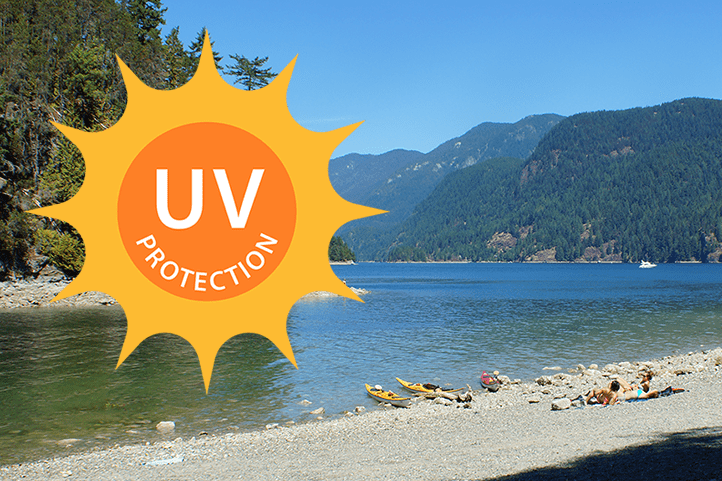By Nirmal Kaur Seehra
2024 UBC PharmD Candidate
When selecting a sunscreen product, you want something that provides your skin with broad spectrum coverage. What does this actually mean though? It means that you’ll want to pick ingredients that can offer protection against both UVA and UVB radiation that is emitted from the sun. (2)
UVA radiation is able to penetrate skin the deepest and remains constant throughout the year. This is why you need to apply sunscreen daily, regardless of season. There are two subcategories of UVA rays (UVA1 and UVA2), and they can have various harmful effects on the human body, such as photoaging, skin cancer, sunburn, cataracts, retinal damage, and immunosuppression (2). In contrast, UVB radiation is most intense in the summer, at higher altitudes, and between 10 AM to 4 PM. UVB rays can cause sunburn and hyperpigmentation of the skin, including darkening of acne lesions. (2)
The ingredients on the back of a sunscreen bottle often sound like gibberish, but it is important to pay close attention to them to prevent skin and environmental damage. Several chemical ingredients have already been banned in popular vacation spots like Hawaii, Mexico, California, and Thailand, due to toxicity to marine life. If you travel with sunscreens that contain toxic chemicals, you may be fined and your sunscreen product(s) may get confiscated. (1)
The following table compares the relative effectiveness of the different sun blockers, along with their environmental impact. (4) Although exfoliating beads and parabens (3) are not included in the table, it should be noted that these ingredients have also been banned in certain countries. Research on environmental toxins is ongoing, so it is important to check your destination country’s travel advisories for the most up-to-date list of banned chemicals.
| Chemical Blockers | ||||
| UVA1 Protection | UVA2 Protection | UVB Protection | Environmental Impact (1) |
|
| Salicylates (octyl salicylate, octisalate, 2-ethylhexyl salicylate, homosalate) |
Minimal UVB protection | Homosalate is a known toxin and banned in some countries | ||
| Aminobenzoates (p-aminobenzoic acid or PABA) |
Partial UVB protection | |||
| Cinnamates (octinoxate/octyl methoxycinnamate, 2-ethylhexyl p-methoxycinnamate, Parsol MCX) |
Full UVB protection | Octinoxate is a known toxin and banned in some countries | ||
| Octocrylene | Full UVB protection | Known toxin and banned in some countries | ||
| Benzimidazoles (phenylbenzimidazole/ ensulizole, enzulizole phenylbenzimidazole-5-sulfonic acid, Parsol HS) |
Full UVA2 protection | Full UVB protection | ||
| Benzophenones (oxybenzone, benzophenone-3) | Minimal UVA1 protection | Full UVA2 protection | Full UVB protection | Known toxin and banned in some countries |
| Anthranilates (menthyl anthranilate/meradimate) | Full UVA2 protection | |||
| Hydroxy-benzotriazoles (Mexoryl XL/ drometrizole trisiloxane, silatriazole) | Minimal UVA1 protection | Full UVA2 protection | Full UVB protection | |
| Dibenzoyl-methanes (avobenzone, butyl methoxydibenzoylmethane, Parsol 1789) | Full UVA1 protection | Full UVA2 protection | Minimal UVB protection | |
| Ecamsule/Mexoryl SX (terephthalylidene dicamphor sulfonic acid) | Full UVA1 protection | Full UVA2 protection | Full UVB protection | |
| Enzacamene (4-methylbenzylidene camphor, Parsol 5000) |
Full UVB protection | Known toxin and banned in some countries | ||
| bemotrizonol/tinosorb-S, bisoctrizole/tinosaorb-M | Full UVA1 protection | Full UVA2 protection | Full UVB protection | Potentially toxic- additional research is required |
| Physical Blockers | ||||
| UVA1 Protection | UVA2 Protection | UVB Protection | Environmental Impact (1) |
|
| Titanium Dioxide | Full UVA2 protection | Full UVB protection | Generally non-toxic, unless particles are nano-sized (1) | |
| Zinc Oxide | Full UVA1 protection | Full UVA2 protection | Full UVB protection | |
While chemical blockers may look more elegant due to their reduced particle size, this also reduces sun protection (1). These are sometimes referred to as nano-particles. (1) Overall, you may wish to choose a sunscreen product that contains zinc oxide, as it offers the highest level of sun protection and is environmentally friendly. For example, we carry Cliniderm Mineral Sunscreen and the ThinkBaby and ThinkSport products, which include zinc oxide and are safe for sensitive skin.
In addition to picking a product with zinc oxide, it is critical that you are applying sunscreen correctly and are following appropriate sun protection measures based on the UV index in your geographic area. For more information, you may want to visit Medicine Shoppe Canada’s website for additional tips on choosing and applying sunscreen and a discussion of some of the myths about sun protection.
If you have any other questions about sunscreen products, speak with your pharmacist.
References
- Chatzigianni M, Pavlou P, Siamidi A, Vlachou M, Varvaresou A, Papageorgiou S. National Library of Medicine; [published 2022 Sep 29; cited 2023 Jun 13]. Environmental Impacts Due To The Use of Sunscreen Products: A Mini-Review. Available from: https://www.ncbi.nlm.nih.gov/pmc/articles/PMC9652235/
- Kleiman N. e-CPS [Internet]. Ottawa (ON): Canadian Pharmacists Association; [updated 2022 Aug 18; cited 2023 Jun 13]. Prevention and Treatment of Sun-Induced Skin Damage. Available from: https://www.myrxtx.ca Also available in paper copy from the publisher.
- Maia C, Sousa CA, Sousa H, Vale F, Simões M. [published 2023 Feb 1; cited 2023 Jun 13]. Parabens removal from wastewaters by microalgae – Ecotoxicity, metabolism and pathways. Chemical Engineering Journal. 2023 Feb;453:139631. Available from: https://www.sciencedirect.com/science/article/pii/S1385894722051105
- Watson H. Chemical and Physical Sunscreen UV Coverage. [updated 2016; cited 2023 Jun 13]. Available from: https://rxnotes.ca/wp-content/uploads/2018/03/lecture-1-3-sun-disorders-sunscreens.pdf
